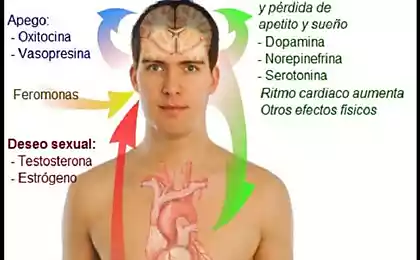707
4 types of modern love
They say that the Eskimos of North America have from 50 to 100 unique names for snow
In the languages of many indigenous peoples, are incredibly detailed descriptions of the plants, land, or structure of the jungle. This gives them the opportunity to better understand the environment and share knowledge about how best to move forward or get out of a difficult situation. A more detailed description of your surroundings will allow you to better understand the world in which you live.
Ninety one million eight hundred forty five thousand three hundred eighty eight
Why, then, we have only one word to Express the innermost feelings?
Love.
Is our love of the movie "the Avengers" is exactly the same as our feelings for the beloved?
Or your Breakfast is in your heart the same place as your mother? Probably not.
We need a more complete description of love, we must hone its definition to be able to more accurately describe their emotions and to intensify our understanding of the world. Fortunately, we do have these descriptions.
They were lost; the sacred knowledge was sacrificed to the ruthless time, the progress of society and culture. Our desire to flesh out the description of love help both the ancient Greeks and modern psychologists. Using their terminology, we can more clearly Express their feelings to the events of everyday life and our relationship and become closer and clearer to our relatives, colleagues and neighbors.
Of course, we know that not all love is the same.
That's why the concept of "soul mate" still resonates in many love stories. That is why some supporters of strict relations beware of random connections, which "cast a shadow" on the delicate nature of true love.
Deep down we realize that love has different levels and that it manifests in different ways – so how are we all this with one single term?
It seems that the time has come to update our emotional dialect.
4 concept of love of ancient philosophers
The ancient Greeks split love into 4 main types:Eros, Philia, storge and Agape.
1. Eros (Passionate / Intimate love)
"Eros" means sexual or romantic love. The Greek word for "erotas" means "intimate love." From this word came the modern notion of "erotic".
In modern society it's sexual or intimate passion that you feel towards any person. The alluring attraction of well-dressed women, or the irresistible charm of a fashionable gentleman.
Eros is the sensual attraction to the beauty of a person. Usually it is the feeling that occurs between lovers, or love of the population towards "standard beauty ideal" that is promoted and encouraged. Eros mobile, it is constantly changing. Over time you will increasingly fall under the influence of the partner, Eros evolyutsioniruet. Although originally this love of beauty, it can grow into a love for the person, to go beyond physical attractiveness.
In his acclaimed work "the Feast" Plato argues that Eros helps us to understand beauty in its true form. He notes that love does not require physical attraction and that beauty can be found in all people – hence we got the idea of "Platonic love", that is, love without physical attraction.
"He who love touches not walks in darkness" Plato, "the Feast"
Plato is known for his "theory of ideas" is the idea that the idea of some object or phenomenon is never identical to its "real" manifestation. This idea is reflected in the concept of Plato about Eros: true beauty is not what is seen on the surface.
The passion of Eros is a precursor to the establishment of relations. You must feel the attractiveness of the other person. You have to appreciate its beauty.
But be careful. A relationship built solely on the basis of Eros, will not last long as this is ignored or overlooked deep essence of love.
Fifty seven million two hundred seventy six thousand nine hundred seventy four
Have you ever been acquainted with a couple that came together only on the basis of the visual attractiveness of the partner? Yeah.
How long have they been together? No.
Eros draws us to look at, but constant thoughts about the beauty of the person pushing us to the path of realizing the true nature of beauty, boundless and unconditional.
2. Philia (Friendly / Brotherly love)
Philia is friendship, brotherly love. The love of close friends, mentors, groups of people, their loved ones.
An important distinction between Eros and Philia is that Philia is the asexual, virtuous love. It is asexual in the sense that does not imply a romantic relationship.
Philia is love that is based on respect, partnership, understanding.
"The deepest human need is to overcome their isolation and get out of the prison of loneliness." – Erich Fromm "Art of loving"
This is the feeling you have when your friend trusts you with some important personal secrets, and you become a partaker of the mystery. This feeling of deep respect and empathy that occurs when you try to reduce the pain of others and to understand the root of suffering.
In particular, the definition of affiliate as a dispassionate, virtuous love given by Aristotle in his famous work "Nicomachean ethics". In this work Aristotle indicates two subspecies Filii.
He notes that on the one hand, described earlier, deep devotion and closeness to your friends. On the other hand, he treats the branch as a manifestation of total love for their peers, community or family activities.
He describes Philia as a rush of pleasure that you experience during the class favorite sport as respect for their classmates or as a serene happiness that comes after a nice walk in the Park.
Philia – this is an exciting concept, because it is the least natural of all forms of love. The biological necessity of Philia or friendly love is still hidden from modern science. Because Philia is the least natural, it is considered as one of the highest levels, because the object of such love, a person selects independently and freely.
That is why many of us feel a great attachment to his friends than to relatives. There is a popular saying: "Friends are the family you choose yourself". Voluntary invitation to someone on this level your life is a sign of deep trust and empathy, and Philia describes this.
C. S. Lewis, describing these four types of love, says: "... in ancient times, unlike the modern world, which ignores it, friendship seemed the happiest and most complete form of human love, the crown of life and school of virtue."
Trait. Have you ever met a friendship for a fee?
Although the concept of branch could be extended to family relationships (which it usually also is), to describe love for family better suited another term – this is our third form of love, storge.
3. Storge (Family / Sweet Love)
Storge is family love, affectionate love to his family, be it your son, daughter, mother, father or the wider family.
Storge is considered to be innate, most natural and natural form of love that we know.
You never did anything to earn the love of your mother? Have you ever "think" about what love your brother?
No.
This love is in us by nature. It is universal and omnipresent.
This is a natural emotional empathy for its own kind, which is programmed in parents and all family members. The similarity of their individual traits with many traits of other family members leads to a natural sympathy for the family.
Storge is natural because it exists in us without any effort. Love for their children is innate.
Storge is an instinctive, she appears as a consequence of your affinity and friendship that occurs as a result of this similarity.
Finally, storge is the most common, because it is not necessary "to deserve". It is the least selective of all forms, as its object is not required "to be worthy" of love. It's just mutual affection on the basis of innate similarities. In storge lacks all the filters and comparison criteria, which is typical of Eros and Philia, love, which is easiest given, but is the most fragile.
Why storge fragile?
Because the reason for its prevalence are natural tendencies and expectations.
Let's look at the example of "respect for elders".
Often the main reason why we should respect elders, is simply storge – the idea that you should love your family. Thus, the argument reads as follows: you should love and respect your family because you have to love and respect his family. This is a great argument.
It deprives us of the need to do some actions to earn this love.
It is expected that the individual will receive the love and respect regardless of his actions. That love him "entitled" by right of birth.
I remember how I hated it as a child, I just could not summon up that feeling. My grandparents often neglect my desires and was rude, if I did something they disapproved of. It was expected that I will love them without any attempt on their part to earn it. I was worried by the feeling that I didn't choose the relationship, and was born with them, and that I should show respect without any effort from senior to earn it.
Although the love of family is the most common, basic form of love, it should find its way to the surface through words, actions and understanding.
The stack is Yang in relation to Yin Filii. Branch is a high – level love, precisely because it is selected: it is selected by us.
We work for its occurrence.
In a historical context, storge is almost exclusively used to describe family love and not commonly used outside this context.
This is a natural and tireless concern and care of parents towards their children, and this is the basic Foundation on which other forms of love: Eros, Philia, Agape.
Storge – this is our first experience of love, an innate and unconditional, which gives us the life force to nurture all other forms of love.
4. Agape (unconditional love)
Agape is the highest form of love because it is unconditional love. It is usually referred to as the love of God to man and man's love to God.
Agape is the overwhelming love.
Regardless of the context, external conditions, new factors or feelings, Agape is not subject to any changes. Agape is widely known as the love that we ascribe to all "enlightened" people – the people who show respect, understanding and compassion for all beings, without any hesitation, arguments and conditions.
Agape is unconditional love to yourself and to everyone else.
It's deeper than love-storge. It's not just sympathy towards their family, it's relentless, unconditional love with which the mother empathizes with her child. It's love that makes you suffer for your loved ones. This love is so pure and so strong that it is able to very few.
Seventy one million two hundred ninety two thousand two hundred seventy eight
Modern and ancient scholars and writers have repeatedly touched on this issue. If your love extends to all mankind unconditionally, then you do not yet know true love.
Agape is the highest form of the four, because it exists out of context; change of circumstances or change of individuals do not affect Agape.
Agape beautifully brings us back to the "Golden rule", which manifests itself worldwide in different religious Scriptures – "do unto others as you would like them to do to you."
Agape is when you treat all beings with kindness, not because they did something kind to you, and just because you're a good man.
Agape is what we strive for in life. Agape exists unconditionally.
This is the main purpose of all relationships, when the partner accepts us for who we are, with all our shortcomings, weaknesses, stains and bruises. This is the main purpose of social interactions, when we accept everyone from Prince to beggar, without hesitation or reasoning.
The views of modern psychologists on modern love
Modern society has moved away from understanding the four forms of love listed above, but traditional psychology haven't. In reality, the understanding of love by modern psychologists directly related to the definitions of Eros, Philia, storge and Agape.
Modern psychology divides love into four types: mindless, romantic, friendly and perfect.
1. Mindless love
Mindless love is sexual attraction without an emotional proximity. This is purely a sexual, physical love.
Although we divide our definitions of love into different categories, this does not mean that the thoughtless love is "inferior"; it's just one of the forms of love. Mindless love is needed to continue our species.
We have considered Eros as the "developing" a form of love. The initial fascination with the physical beauty of a person then turns into a desire to understand the true nature of beauty and love for the person, regardless of physical beauty.
Mindless love seems to be very well suited to describe the early stage of Eros. With the development of the Eros people were moving away from the mindless love and more appeal to the inner beauty of a person. Thus, we move on to the next form of love: romantic love.
2. Romantic love
If after a thoughtless love you begin to feel respect, affection and interest, it means the awakening of romantic love. Romantic love builds over time, along with a sense of reverence and respect. It adds to the sexual attraction (Eros) a sense of comfort, security and respect.
The most common type of relationship in modern society is all kinds of transitional forms from the mindless love to love romantic.
It is also a form that leads to a lot of stress.
If one partner is "taken" more, or if one person is more attracted to external data, and the second progressed to the stage of romantic love, you can feel that in a relationship, "the discord". These differences of inner feelings make the relationship strained. Remember, try to deepen your relationships and better understand the feelings of your partner. This is the best way to assess the prospects of your life together.
How do you feel about each other? Is this romantic love? Or is it rather the love of the other? Here we come to our next definition of friendly love.
3. Friendly love
According to psychologists, this is the third kind of love. It has much in common with Filia (and partly with storge) of the ancient Greeks. It is a deep respect and love between friends and peers. It's proximity and loyalty based on respect and benevolent actions.
It does not necessarily lead to the emergence of romantic love or sexual desire and can remain Platonic. It develops over time, and there are very specific actions you can take to deepen the love among your inner circle.
Show your vulnerability, let the person know that he is important to you, emphasize what you value, all of which can strengthen the friendly love and your relationship.
4. Perfect love
In conclusion, we see how the concept of "Agape" transformed the definition of the "perfect love". The concept of "perfect" resonates with the idea of Agape, which is all-consuming, unconditional love.
This love implies passion, and togetherness, and sense of responsibility. It does not require conformity to some standards, but is unconditional and free.
This is the love that we all seek in our romantic relationships, but which not all can achieve.
It is the love of God to man and the love of a mother for her offspring. It's the sparkle in your eyes when you see your loved ones, even if they are not in the best shape.
This does not mean that your relationship is always cloudless. In fact, quite the opposite. Can be a lot of tense moments. However, they do not detract from your feeling of love, perfect love is not dependent on circumstances.
Now that we examined the evolution of four different types of love, ranging from ideas of the ancient Greeks (Eros, Philia, storge, Agape) until definitions of modern psychologists (thoughtless, romantic, friendly, perfect), how can we apply this knowledge? As our keen understanding of love can help in our daily life?
We begin to understand the nature of our love and have the opportunity to deepen it.
Ninety one million three hundred ninety nine thousand three hundred seventy five
How to determine which form of love is dominant in our relationship
Having the opportunity to describe your love, given subtle nuances, you can accurately describe their relationship. These lenses will help you to understand as love, social relationships, and it gives you the opportunity to develop them according to your desire.
If we are talking about Eros, or passionate romantic love, you can determine what is the basis of your relationship:
• Whether your relationship is tense, if you change your appearance or image?
• Will act as your partner in the event of your illness?
• You talk about their relationships on social networks or colleagues?
• You praise for certain features or for all?
• What your partner appreciates in you? What does he like about your character?
The answers to these questions will help to understand how far you have advanced on the path from love to love mindless romantic, and tune accordingly.
Love is the only aspect of our lives, against which we cannot be satisfied with a mediocre result.
Understanding what stage you are in, helps build relationships.
Speaking about the branch or about your friendships and family relationships, you can understand who you really close to and who just uses your friendship:
• Do you have friends that ask you for a favor, but they are not willing to help when you ask for it?
• Your friends come to you uninvited?
• Do you feel that you can trust and truly open up in front of your friends and family?
• Do you respect and trust among his friends?
• If you have good news, with whom you would like to share it in the first place?
• Who in your life you deeply respect?
As we have noted, this is one of the highest levels of love because it is love based on our personal choice. You decide who to approach, so make sure that you are surrounded by only those who love you.
"You can't change the people around you, but you can change your surroundings." – Slogan of the minimalist
Friends are incredibly important. Make sure you surround yourself with good people.
Finally, we turn to Agape. Often it is personal understanding and embodiment of love. Is your relationship with love and peace. It's a love that can be grown over time:
• Do you see the intrinsic value of each person?
• Do you feel that love is worthy of the individual, and not all?
• Do you feel that love is worthy only certain types of people?
• You share your love only those who love you or have done something worthy of love?
• Are there such things, making people can't count on your future love?
Agape is unconditional love. Unconditional. Find those areas in which you furnish the possibility of love with any of these terms and solve this problem.
How to develop and deepen the love in your life
There are a number of ways that can help us make our love better, to feel it deeply and Express it honestly and openly.
The first step should be the ability to clearly describe his love. Now we have a fine definition for it: Eros, Philia, storge, Agape.
The next step will be to find places that take our relationship in this spectrum. Whether our relationship is superficial or deep, and how we Express our love?
Then we can take action in order to move forward. Here are some ways to do this:
• Practice the meditation of kindness and love. Show your love to all whom you meet.
• Challenge a sense of gratitude throughout the day. We can't love other people effectively, or to love, until we introduce ourselves in a state of love. Develop it in yourself.
• Pay attention towards the friends. Instead of sitting and watching TV, ask them about the challenges they face and how you can help. Thank them for any assistance given to you and don't forget to say how much appreciate their attitude.
• Try to gain a deeper understanding of your partner. Are based whether your relationship just for appearance? Or do you see the true inner beauty of your partner? You appreciate beautiful soul or just a pretty face?
• Ask questions that will allow you to take part. Move to unconditional love to that person and to all people. Ask what people fight what they fear, what they are passionate about and how you can help them.
Love is one of the most important events in our lives. We all strive for love. But too often we regret what came.
If we make a conscious effort to the understanding and cultivation of love, we will be able to plunge deeper into the emotional and spiritual state.
Enjoy Eros, develop Philia, storge respect and live with Agape.published
P. S. And remember, just changing your mind — together we change the world! ©
Source: //muz4in.net/news/4_tipa_sovremennoj_ljubvi_i_kak_oni_radikalno_vlijajut_na_vashi_otnoshenija/2017-04-28-43060
In the languages of many indigenous peoples, are incredibly detailed descriptions of the plants, land, or structure of the jungle. This gives them the opportunity to better understand the environment and share knowledge about how best to move forward or get out of a difficult situation. A more detailed description of your surroundings will allow you to better understand the world in which you live.
Ninety one million eight hundred forty five thousand three hundred eighty eight
Why, then, we have only one word to Express the innermost feelings?
Love.
Is our love of the movie "the Avengers" is exactly the same as our feelings for the beloved?
Or your Breakfast is in your heart the same place as your mother? Probably not.
We need a more complete description of love, we must hone its definition to be able to more accurately describe their emotions and to intensify our understanding of the world. Fortunately, we do have these descriptions.
They were lost; the sacred knowledge was sacrificed to the ruthless time, the progress of society and culture. Our desire to flesh out the description of love help both the ancient Greeks and modern psychologists. Using their terminology, we can more clearly Express their feelings to the events of everyday life and our relationship and become closer and clearer to our relatives, colleagues and neighbors.
Of course, we know that not all love is the same.
That's why the concept of "soul mate" still resonates in many love stories. That is why some supporters of strict relations beware of random connections, which "cast a shadow" on the delicate nature of true love.
Deep down we realize that love has different levels and that it manifests in different ways – so how are we all this with one single term?
It seems that the time has come to update our emotional dialect.
4 concept of love of ancient philosophers
The ancient Greeks split love into 4 main types:Eros, Philia, storge and Agape.
1. Eros (Passionate / Intimate love)
"Eros" means sexual or romantic love. The Greek word for "erotas" means "intimate love." From this word came the modern notion of "erotic".
In modern society it's sexual or intimate passion that you feel towards any person. The alluring attraction of well-dressed women, or the irresistible charm of a fashionable gentleman.
Eros is the sensual attraction to the beauty of a person. Usually it is the feeling that occurs between lovers, or love of the population towards "standard beauty ideal" that is promoted and encouraged. Eros mobile, it is constantly changing. Over time you will increasingly fall under the influence of the partner, Eros evolyutsioniruet. Although originally this love of beauty, it can grow into a love for the person, to go beyond physical attractiveness.
In his acclaimed work "the Feast" Plato argues that Eros helps us to understand beauty in its true form. He notes that love does not require physical attraction and that beauty can be found in all people – hence we got the idea of "Platonic love", that is, love without physical attraction.
"He who love touches not walks in darkness" Plato, "the Feast"
Plato is known for his "theory of ideas" is the idea that the idea of some object or phenomenon is never identical to its "real" manifestation. This idea is reflected in the concept of Plato about Eros: true beauty is not what is seen on the surface.
The passion of Eros is a precursor to the establishment of relations. You must feel the attractiveness of the other person. You have to appreciate its beauty.
But be careful. A relationship built solely on the basis of Eros, will not last long as this is ignored or overlooked deep essence of love.
Fifty seven million two hundred seventy six thousand nine hundred seventy four
Have you ever been acquainted with a couple that came together only on the basis of the visual attractiveness of the partner? Yeah.
How long have they been together? No.
Eros draws us to look at, but constant thoughts about the beauty of the person pushing us to the path of realizing the true nature of beauty, boundless and unconditional.
2. Philia (Friendly / Brotherly love)
Philia is friendship, brotherly love. The love of close friends, mentors, groups of people, their loved ones.
An important distinction between Eros and Philia is that Philia is the asexual, virtuous love. It is asexual in the sense that does not imply a romantic relationship.
Philia is love that is based on respect, partnership, understanding.
"The deepest human need is to overcome their isolation and get out of the prison of loneliness." – Erich Fromm "Art of loving"
This is the feeling you have when your friend trusts you with some important personal secrets, and you become a partaker of the mystery. This feeling of deep respect and empathy that occurs when you try to reduce the pain of others and to understand the root of suffering.
In particular, the definition of affiliate as a dispassionate, virtuous love given by Aristotle in his famous work "Nicomachean ethics". In this work Aristotle indicates two subspecies Filii.
He notes that on the one hand, described earlier, deep devotion and closeness to your friends. On the other hand, he treats the branch as a manifestation of total love for their peers, community or family activities.
He describes Philia as a rush of pleasure that you experience during the class favorite sport as respect for their classmates or as a serene happiness that comes after a nice walk in the Park.
Philia – this is an exciting concept, because it is the least natural of all forms of love. The biological necessity of Philia or friendly love is still hidden from modern science. Because Philia is the least natural, it is considered as one of the highest levels, because the object of such love, a person selects independently and freely.
That is why many of us feel a great attachment to his friends than to relatives. There is a popular saying: "Friends are the family you choose yourself". Voluntary invitation to someone on this level your life is a sign of deep trust and empathy, and Philia describes this.
C. S. Lewis, describing these four types of love, says: "... in ancient times, unlike the modern world, which ignores it, friendship seemed the happiest and most complete form of human love, the crown of life and school of virtue."
Trait. Have you ever met a friendship for a fee?
Although the concept of branch could be extended to family relationships (which it usually also is), to describe love for family better suited another term – this is our third form of love, storge.
3. Storge (Family / Sweet Love)
Storge is family love, affectionate love to his family, be it your son, daughter, mother, father or the wider family.
Storge is considered to be innate, most natural and natural form of love that we know.
You never did anything to earn the love of your mother? Have you ever "think" about what love your brother?
No.
This love is in us by nature. It is universal and omnipresent.
This is a natural emotional empathy for its own kind, which is programmed in parents and all family members. The similarity of their individual traits with many traits of other family members leads to a natural sympathy for the family.
Storge is natural because it exists in us without any effort. Love for their children is innate.
Storge is an instinctive, she appears as a consequence of your affinity and friendship that occurs as a result of this similarity.
Finally, storge is the most common, because it is not necessary "to deserve". It is the least selective of all forms, as its object is not required "to be worthy" of love. It's just mutual affection on the basis of innate similarities. In storge lacks all the filters and comparison criteria, which is typical of Eros and Philia, love, which is easiest given, but is the most fragile.
Why storge fragile?
Because the reason for its prevalence are natural tendencies and expectations.
Let's look at the example of "respect for elders".
Often the main reason why we should respect elders, is simply storge – the idea that you should love your family. Thus, the argument reads as follows: you should love and respect your family because you have to love and respect his family. This is a great argument.
It deprives us of the need to do some actions to earn this love.
It is expected that the individual will receive the love and respect regardless of his actions. That love him "entitled" by right of birth.
I remember how I hated it as a child, I just could not summon up that feeling. My grandparents often neglect my desires and was rude, if I did something they disapproved of. It was expected that I will love them without any attempt on their part to earn it. I was worried by the feeling that I didn't choose the relationship, and was born with them, and that I should show respect without any effort from senior to earn it.
Although the love of family is the most common, basic form of love, it should find its way to the surface through words, actions and understanding.
The stack is Yang in relation to Yin Filii. Branch is a high – level love, precisely because it is selected: it is selected by us.
We work for its occurrence.
In a historical context, storge is almost exclusively used to describe family love and not commonly used outside this context.
This is a natural and tireless concern and care of parents towards their children, and this is the basic Foundation on which other forms of love: Eros, Philia, Agape.
Storge – this is our first experience of love, an innate and unconditional, which gives us the life force to nurture all other forms of love.
4. Agape (unconditional love)
Agape is the highest form of love because it is unconditional love. It is usually referred to as the love of God to man and man's love to God.
Agape is the overwhelming love.
Regardless of the context, external conditions, new factors or feelings, Agape is not subject to any changes. Agape is widely known as the love that we ascribe to all "enlightened" people – the people who show respect, understanding and compassion for all beings, without any hesitation, arguments and conditions.
Agape is unconditional love to yourself and to everyone else.
It's deeper than love-storge. It's not just sympathy towards their family, it's relentless, unconditional love with which the mother empathizes with her child. It's love that makes you suffer for your loved ones. This love is so pure and so strong that it is able to very few.
Seventy one million two hundred ninety two thousand two hundred seventy eight
Modern and ancient scholars and writers have repeatedly touched on this issue. If your love extends to all mankind unconditionally, then you do not yet know true love.
Agape is the highest form of the four, because it exists out of context; change of circumstances or change of individuals do not affect Agape.
Agape beautifully brings us back to the "Golden rule", which manifests itself worldwide in different religious Scriptures – "do unto others as you would like them to do to you."
Agape is when you treat all beings with kindness, not because they did something kind to you, and just because you're a good man.
Agape is what we strive for in life. Agape exists unconditionally.
This is the main purpose of all relationships, when the partner accepts us for who we are, with all our shortcomings, weaknesses, stains and bruises. This is the main purpose of social interactions, when we accept everyone from Prince to beggar, without hesitation or reasoning.
The views of modern psychologists on modern love
Modern society has moved away from understanding the four forms of love listed above, but traditional psychology haven't. In reality, the understanding of love by modern psychologists directly related to the definitions of Eros, Philia, storge and Agape.
Modern psychology divides love into four types: mindless, romantic, friendly and perfect.
1. Mindless love
Mindless love is sexual attraction without an emotional proximity. This is purely a sexual, physical love.
Although we divide our definitions of love into different categories, this does not mean that the thoughtless love is "inferior"; it's just one of the forms of love. Mindless love is needed to continue our species.
We have considered Eros as the "developing" a form of love. The initial fascination with the physical beauty of a person then turns into a desire to understand the true nature of beauty and love for the person, regardless of physical beauty.
Mindless love seems to be very well suited to describe the early stage of Eros. With the development of the Eros people were moving away from the mindless love and more appeal to the inner beauty of a person. Thus, we move on to the next form of love: romantic love.
2. Romantic love
If after a thoughtless love you begin to feel respect, affection and interest, it means the awakening of romantic love. Romantic love builds over time, along with a sense of reverence and respect. It adds to the sexual attraction (Eros) a sense of comfort, security and respect.
The most common type of relationship in modern society is all kinds of transitional forms from the mindless love to love romantic.
It is also a form that leads to a lot of stress.
If one partner is "taken" more, or if one person is more attracted to external data, and the second progressed to the stage of romantic love, you can feel that in a relationship, "the discord". These differences of inner feelings make the relationship strained. Remember, try to deepen your relationships and better understand the feelings of your partner. This is the best way to assess the prospects of your life together.
How do you feel about each other? Is this romantic love? Or is it rather the love of the other? Here we come to our next definition of friendly love.
3. Friendly love
According to psychologists, this is the third kind of love. It has much in common with Filia (and partly with storge) of the ancient Greeks. It is a deep respect and love between friends and peers. It's proximity and loyalty based on respect and benevolent actions.
It does not necessarily lead to the emergence of romantic love or sexual desire and can remain Platonic. It develops over time, and there are very specific actions you can take to deepen the love among your inner circle.
Show your vulnerability, let the person know that he is important to you, emphasize what you value, all of which can strengthen the friendly love and your relationship.
4. Perfect love
In conclusion, we see how the concept of "Agape" transformed the definition of the "perfect love". The concept of "perfect" resonates with the idea of Agape, which is all-consuming, unconditional love.
This love implies passion, and togetherness, and sense of responsibility. It does not require conformity to some standards, but is unconditional and free.
This is the love that we all seek in our romantic relationships, but which not all can achieve.
It is the love of God to man and the love of a mother for her offspring. It's the sparkle in your eyes when you see your loved ones, even if they are not in the best shape.
This does not mean that your relationship is always cloudless. In fact, quite the opposite. Can be a lot of tense moments. However, they do not detract from your feeling of love, perfect love is not dependent on circumstances.
Now that we examined the evolution of four different types of love, ranging from ideas of the ancient Greeks (Eros, Philia, storge, Agape) until definitions of modern psychologists (thoughtless, romantic, friendly, perfect), how can we apply this knowledge? As our keen understanding of love can help in our daily life?
We begin to understand the nature of our love and have the opportunity to deepen it.
Ninety one million three hundred ninety nine thousand three hundred seventy five
How to determine which form of love is dominant in our relationship
Having the opportunity to describe your love, given subtle nuances, you can accurately describe their relationship. These lenses will help you to understand as love, social relationships, and it gives you the opportunity to develop them according to your desire.
If we are talking about Eros, or passionate romantic love, you can determine what is the basis of your relationship:
• Whether your relationship is tense, if you change your appearance or image?
• Will act as your partner in the event of your illness?
• You talk about their relationships on social networks or colleagues?
• You praise for certain features or for all?
• What your partner appreciates in you? What does he like about your character?
The answers to these questions will help to understand how far you have advanced on the path from love to love mindless romantic, and tune accordingly.
Love is the only aspect of our lives, against which we cannot be satisfied with a mediocre result.
Understanding what stage you are in, helps build relationships.
Speaking about the branch or about your friendships and family relationships, you can understand who you really close to and who just uses your friendship:
• Do you have friends that ask you for a favor, but they are not willing to help when you ask for it?
• Your friends come to you uninvited?
• Do you feel that you can trust and truly open up in front of your friends and family?
• Do you respect and trust among his friends?
• If you have good news, with whom you would like to share it in the first place?
• Who in your life you deeply respect?
As we have noted, this is one of the highest levels of love because it is love based on our personal choice. You decide who to approach, so make sure that you are surrounded by only those who love you.
"You can't change the people around you, but you can change your surroundings." – Slogan of the minimalist
Friends are incredibly important. Make sure you surround yourself with good people.
Finally, we turn to Agape. Often it is personal understanding and embodiment of love. Is your relationship with love and peace. It's a love that can be grown over time:
• Do you see the intrinsic value of each person?
• Do you feel that love is worthy of the individual, and not all?
• Do you feel that love is worthy only certain types of people?
• You share your love only those who love you or have done something worthy of love?
• Are there such things, making people can't count on your future love?
Agape is unconditional love. Unconditional. Find those areas in which you furnish the possibility of love with any of these terms and solve this problem.
How to develop and deepen the love in your life
There are a number of ways that can help us make our love better, to feel it deeply and Express it honestly and openly.
The first step should be the ability to clearly describe his love. Now we have a fine definition for it: Eros, Philia, storge, Agape.
The next step will be to find places that take our relationship in this spectrum. Whether our relationship is superficial or deep, and how we Express our love?
Then we can take action in order to move forward. Here are some ways to do this:
• Practice the meditation of kindness and love. Show your love to all whom you meet.
• Challenge a sense of gratitude throughout the day. We can't love other people effectively, or to love, until we introduce ourselves in a state of love. Develop it in yourself.
• Pay attention towards the friends. Instead of sitting and watching TV, ask them about the challenges they face and how you can help. Thank them for any assistance given to you and don't forget to say how much appreciate their attitude.
• Try to gain a deeper understanding of your partner. Are based whether your relationship just for appearance? Or do you see the true inner beauty of your partner? You appreciate beautiful soul or just a pretty face?
• Ask questions that will allow you to take part. Move to unconditional love to that person and to all people. Ask what people fight what they fear, what they are passionate about and how you can help them.
Love is one of the most important events in our lives. We all strive for love. But too often we regret what came.
If we make a conscious effort to the understanding and cultivation of love, we will be able to plunge deeper into the emotional and spiritual state.
Enjoy Eros, develop Philia, storge respect and live with Agape.published
P. S. And remember, just changing your mind — together we change the world! ©
Source: //muz4in.net/news/4_tipa_sovremennoj_ljubvi_i_kak_oni_radikalno_vlijajut_na_vashi_otnoshenija/2017-04-28-43060























